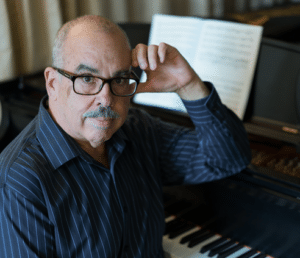For more than three decades, the works of Roberto Sierra have been part of the repertoire of many of the leading orchestras, ensembles, and festivals in the USA and Europe. At the inaugural concert of the 2002 world-renowned Proms in London, his Fandangos was performed by the BBC Symphony Orchestra in a concert that was broadcast by both the BBC Radio and Television throughout the UK and Europe. Many of the major American and European orchestras and international ensembles have commissioned and performed his works.

1. In 2017 you were awarded the Tomás Luis de Victoria Prize, the highest honor given in Spain to a composer of Spanish or Latin American origin. Can you tell us about your experience as a Latino composer and the influence your culture has had on your work?
I have been in the USA since 1989, when I became composer-in-residence with the Milwaukee Symphony, and, looking back, it is amazing to observe the changes that we have gone through. Not only has the cultural landscape changed, but also we now look at society through a different lens, and we have a new generation that is trying to forge a more just and equitable country. There is more acceptance and inclusion, both of women and minority composers, corrective measures that were much needed, and I don’t think that the country will turn the clock back. So, I am optimistic about the future.
My cultural heritage is an integral part of my work, and the sounds I heard growing up in Puerto Rico resonate always in my music. I am interested in looking inwards, but at the same time creating something, something personal and unique is of paramount importance. The musical elements from my heritage are refracted and transformed in my work.
2. Can you tell us a little about your composing process?
I generally start with very simple and concrete ideas, out of which complex structures and sounds evolve. I believe that the origin, the starting point of any artwork needs to be clear. The question of structure and form are also very important; in fact, the larger structure of the work emerges out of the basic material.
3. Of your many popular works, do you have one piece that you are most proud of?
I am always very self-critical, and hope that my next work will be the one I can say, “Ah, this is the one!
4. As a composer you have the opportunity to hear many of your works performed by incredible ensembles. Do you have a favorite moment from one of these experiences?
For me, there is always the magic of hearing the first rehearsal of an orchestral piece. Working recently with the Royal Liverpool Philharmonic conducted by Domingo Hindoyan with solo trumpet Pacho Flores last January was very special. It was a terrific performance!
5. In 2010 you were elected to the prestigious American Academy of Arts and Sciences. What did this honor mean to you?
These distinctions are always wonderful to receive, but at the end, the true recognition for any artist will come through her or his work.
6. How has COVID-19 impacted your work?
Composers stay mainly at home composing, thus my routine has not changed that much. But the unfolding pandemic and the ensuing human tragedy is extremely painful to us all.
7. Have you been able to collaborate with other composers/artists during the lockdown?
I am always in communication about current projects with my collaborators.
8. What technology, including any singing apps or composing apps, have you used to continue to do your work in a virtual world?
Nowadays the computer is the basic tool. Now instead of person-to-person meetings, we are telecommunicating all the time.
9. What would you say to other artists/musicians that are craving ensemble work, and to continue performing as part of their mental health during this pandemic?
My main concern is that we all need to avoid contagion. This will pass, and hopefully soon.
ABOUT ROBERTO SIERRA
For more than three decades, the works of Roberto Sierra have been part of the repertoire of many of the leading orchestras, ensembles, and festivals in the USA and Europe. At the inaugural concert of the 2002 world-renowned Proms in London, his Fandangos was performed by the BBC Symphony Orchestra in a concert that was broadcast by both the BBC Radio and Television throughout the UK and Europe. Many of the major American and European orchestras and international ensembles have commissioned and performed his works. Among those ensembles are the orchestras of Philadelphia, Pittsburgh, Atlanta, New Mexico, Houston, Minnesota, Dallas, Detroit, San Antonio, and Phoenix, as well as the American Composers Orchestra, the New York Philharmonic, Los Angeles Philharmonic, National Symphony Orchestra, Royal Scottish National Orchestra, the Tonhalle Orchestra of Zurich, the Spanish orchestras of Madrid, Galicia, Castilla y León, Barcelona, Continuum, St. Lawrence String Quartet, Opus One, and others.
Commissioned works include: Concerto for Orchestra for the centennial celebrations of the Philadelphia Orchestra commissioned by the Koussevitzky Music Foundation and the Philadelphia Orchestra; Concerto for Saxophones and Orchestra commissioned by the Detroit Symphony Orchestra for James Carter; Fandangos and Missa Latina commissioned by the National Symphony Orchestra of Washington DC; Sinfonía No. 3 “La Salsa”, commissioned by the Milwaukee Symphony Orchestra; Danzas Concertantes for guitar and orchestra commissioned by the Orquesta de Castilla y León; Double Concerto for violin and viola co-commissioned by the Pittsburgh and Philadelphia Orchestras; Bongo+ commissioned by the Juilliard School in celebration of the 100th anniversary; Songs from the Diaspora commissioned by Music Accord for Heidi Grant Murphy, Kevin Murphy and the St. Lawrence String Quartet; and Concierto de Cámara co-commissioned by the the Santa Fe Chamber Music Festival, Chamber Music Northwest and Stanford Lively Arts.
In 2017 he was awarded the Tomás Luis de Victoria Prize, the highest honor given in Spain to a composer of Spanish or Latin American origin. In 2003 he was awarded the Academy Award in Music by the American Academy of Arts and Letters. The award states: “Roberto Sierra writes brilliant music, mixing fresh and personal melodic lines with sparkling harmonies and striking rhythms. . .” His Sinfonía No. 1, a work commissioned by the St. Paul Chamber Orchestra, won the 2004 Kenneth Davenport Competition for Orchestral Works. In 2007 the Serge and Olga Koussevitzky International Recording Award (KIRA) was awarded to Albany Records for the recording of his composition Sinfonía No. 3 “La Salsa”. Roberto Sierra has served as Composer-In-Residence with the Milwaukee Symphony Orchestra, The Philadelphia Orchestra, The Puerto Rico Symphony Orchestra, and New Mexico Symphony. In 2010 he was elected to the prestigious American Academy of Arts and Sciences.
Roberto Sierra’s Music may be heard on CDs by Naxos, EMI, UMG’s EMARCY, New World Records, Albany Records, Koch, New Albion, Koss Classics, BMG, Fleur de Son, and other labels. In 2011 UMG’s EMARCY label released Caribbean Rhapsody featuring the Concierto for Saxophones and Orchestra commissioned and premiered by the DSO with James Carter. In 2004 EMI Classics released his two guitar concertos Folias and Concierto Barroco with Manuel Barrueco as soloist (released on Koch in the USA in 2005). Sierra has been nominated twice for a Grammy under the best contemporary composition category, first in 2009 Missa Latina (Naxos), and in 2014 for his Sinfonia No. 4 (Naxos). In addition, his Variations on a Souvenir (ALbany) and Trio No. 4 (Centaur) were nominated for Latin Grammys in 2009 and 2015.
Roberto Sierra was born in 1953 in Vega Baja, Puerto Rico, and studied composition both in Puerto Rico and Europe, where one of his teachers was György Ligeti at the Hochschule für Musik in Hamburg, Germany. The works of Roberto Sierra are published principally by Subito Music Publishing (ASCAP).
